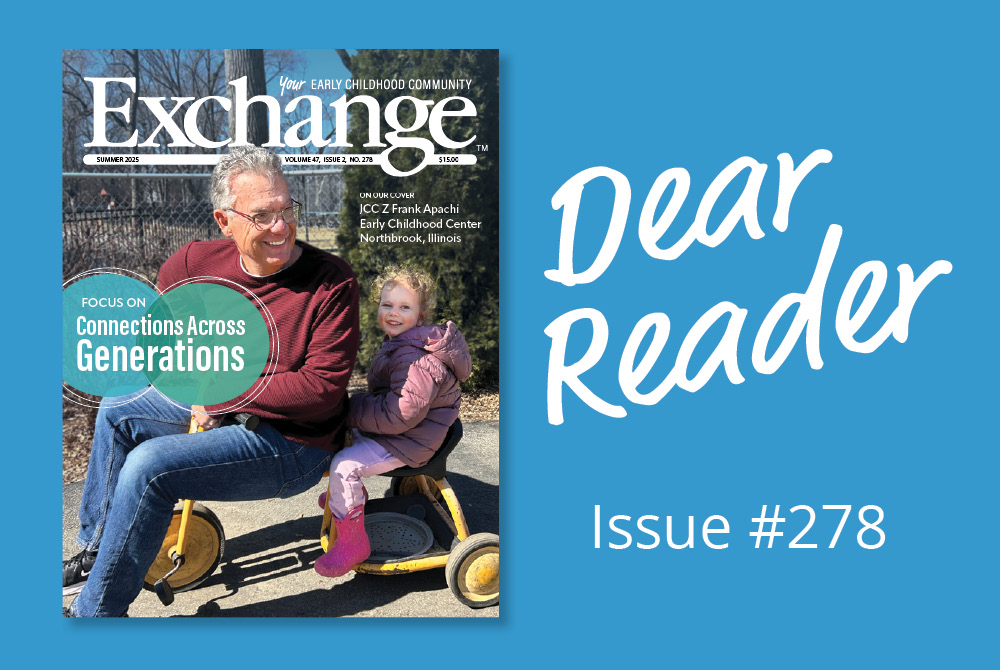As Creative Director of Exchange Press, I have had the privilege of learning and contributing to the Exchange community, and this magazine, for 20 years.
I recently met with with a friend of mine who is the director of a few child care centers in Seattle, Washington. She has opened an infant and toddler program in a beautiful house with a large sycamore tree in the front. I sat down with her in the front yard space, which had been meticulously and intentionally set up for toddlers to explore. There was a courtyard with sand, water, natural objects, and steps to explore. As I met with my friend, she told me all about the many challenges she faces with city regulations, with training teachers, with consistent enrollment, and with money. She was feeling the burden as many have been in early childhood education. As I was noting the heaviness of her situation, a young boy was atop a wooden step, stretching and reaching into a water table. He fell down onto the grass onto his back.
Boop! A surprise!
He did not call out. A teacher saw it happen from across the yard and hustled over. The director quietly advised, “Don’t make a fuss. Don’t pick him up. He is alright. See what he does.” The child was not crying but just lying on his back looking up at the sky. Then he rolled over and stood up. The teacher then said “Look what you did!”
My director friend told me that we have to let children experience the world. Adults too often interrupt this process by taking over the experience. A child falling down is not a failure. It is a part of life. And it does not need to be fixed or interrupted. As educators, we sometimes just need to observe, not take over the situation.
ADVERTISEMENT
Another child was in the sandbox adamantly trying to put another child’s shoe on her foot. She was too large for these sandals. My friend pointed it out again. “You see her over there. Wow, look at her struggle. She is determined to get that shoe on.” She did not need to be corrected. She did not need to be interrupted. She did not need someone to fetch her own shoes. She was allowed to work. To do her work.
I was amazed at my friend’s attention and restraint. It was a good reminder for me to not forget the work of children, even amidst all our adult problems.
We are all experiencing challenges in the field, at our centers, and in our lives. Big and hard problems, no doubt. But the moving river of developing children around us is roaring as it ever was. They are continually absorbing, learning, mimicking, and growing. Our actions as educators, even in small ways, can change how children develop. And oftentimes our actions are to quietly observe and protect their work.
Scott Bilstad is the Creative Director for Exchange Press.
Related
ADVERTISEMENT





 The Dimensions Education Research Foundation and Exchange Press recently lost a pillar of our organization. Rick Reeble was an important part of our team. He was integral in setting up the fulfillment and finance departments for our organization, but more importantly he was always there to help with a challenge. A loving husband, father, and teammate, our organization would not be what it is today without Rick, and we will miss him dearly.
The Dimensions Education Research Foundation and Exchange Press recently lost a pillar of our organization. Rick Reeble was an important part of our team. He was integral in setting up the fulfillment and finance departments for our organization, but more importantly he was always there to help with a challenge. A loving husband, father, and teammate, our organization would not be what it is today without Rick, and we will miss him dearly.





